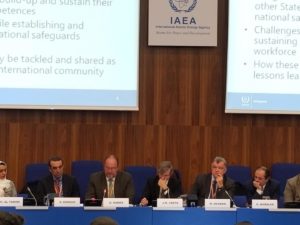IAEA Board of Governors Meeting
(Posted on Monday, June 24, 2019)
David recently attended the International Atomic Energy Agency Board of Governors meeting in Vienna Austria.
http://webtv.un.org/watch/iaea-board-of-governors-june-2019/6047967327001/
The Board of Governors is one of the two policy-making bodies of the IAEA, along with the annual General Conference of IAEA Member States.
The Board examines and makes recommendations to the General Conference on the IAEA’s financial statements, program and budget. It considers applications for membership, approves safeguards agreements and the publication of the IAEA’s safety standards. It also appoints the Director General of the IAEA, with the approval of the General Conference.
The Board generally meets five times per year: in March and June, twice in September (before and after the General Conference) and in November.
Board Members for 2018-2019
The 35 Board Members for 2018-2019 are Argentina, Armenia, Australia, Azerbaijan, Belgium, Brazil, Canada, Chile, China, Ecuador, Egypt, France, Germany, India, Indonesia, Italy, Japan, Jordan, Kenya, the Republic of Korea, Morocco, the Netherlands, Niger, Pakistan, Portugal, the Russian Federation, Serbia, South Africa, the Sudan, Sweden, Thailand, the United Kingdom of Great Britain and Northern Ireland, the United States of America, Uruguay and the Bolivarian Republic of Venezuela
https://www.iaea.org/about/governance/board-of-governors
NMMSS Training
(Posted on Monday, May 20, 2019)
The annual Nuclear Materials Management and Safeguards System (NMMSS) training is held every year to provide a unique forum to learn and share information and experiences related to tracking of nuclear material in the United States. This year NMMSS training was held in Las Vegas, Nevada in May. The week-long arrangement of sessions covers a wide range of important topics that affect domestic and international control, accounting and reporting of nuclear materials. Jointly planned and organized by the Department of Energy(DOE)/National Nuclear Security Administration(NNSA) and the Nuclear Regulatory Commission(NRC), the course covers many topics:
- NRC licensees and DOE facilities nuclear material reporting issues
- Regulatory update and impacts on DOE contractors and NRC licensees
- Nuclear material reporting, lessons learned, and best practices
- Industry roundtable discussions: Materials Control & Accountability, Obligations, Fuel Cycle Facilities
- Import and export of nuclear material
- Basic and advanced nuclear material accountancy training
- Distinguished keynote, invited speakers, and recognized subject matter experts
David Hanks provided a talk on Safeguards Considerations for Advanced Nuclear Fuel Cycle Facilities—Reactors. His talk provided an extensive overview of what might be expected of an engineer in developing small modular reactors to meet an International Atomic Energy Agency (IAEA) safeguards approach.
Activities of NMMSS directly influence the nuclear and national security of the United States. Its products and services are used by a diverse cross-section of stakeholders to support policy, programmatic, and mission decisions.
Entities within both the Executive and the Legislative branches of the U.S. government, the NRC, NNSA organizations, IAEA, and other governments, routinely receive and use NMMSS data. The timeliness and credibility of resultant insights and takeaways is crucial. NMMSS is used for tracking of imports and exports of nuclear materials to support the U.S. role in advancing the global peaceful use of nuclear energy, international transfers of nuclear materials, and transatlantic and transpacific commerce.
Important routine accountancy issues are assisted by NMMSS including reconciliation of inventories for all commercial and government-owned nuclear materials. These include every aspect of the nuclear fuel cycle involving entities licensed by the NRC and nuclear operations. The accounting for and tracking of material subject to obligations facilitate U.S. trade in nuclear material and equipment with foreign countries consistent with Agreement for Peaceful Nuclear Cooperation.
More information on the 2019 NMMSS Users Training Meeting can be found on the NNSA website:
https://nmmss2019.linksolutions.com
https://nmmss2019.linksolutions.com/NMMSS-2019-AGENDA.pdf
IAEA Symposium on International Safeguards
(Posted on Friday, November 16, 2018)
The IAEA holds a Symposium on International Safeguards every four years in order to engage the broader safeguards community in addressing challenges and seizing opportunities to strengthen the effectiveness of safeguards implementation. This year’s symposium took place in Vienna, Austria.
The 2018 symposium’s theme was ‘Building Future Safeguards Capabilities‘, and looked ahead to emerging technologies and innovative approaches with potential for strengthening and streamlining the implementation of safeguards and explore partnerships and mechanisms of relevance going forward.
The objectives of the symposium are to:

- Innovate – by generating new ideas on methods and technologies to substantially improve the IAEA’s technical capabilities and achieve efficiencies in the way it works
- Partner – by mobilizing partnerships to further explore new ideas, bring innovation into the work of the Department of Safeguards, and support long term safeguards research and development needs; and
- Improve – by engaging the safeguards community in sharing experiences, building capabilities, and finding ways to streamline, simplify and improve the implementation of safeguards in the field and at headquarters.
